
55 Misty Meadows Lane
VINEYARD HAVEN, MA 02568
Mailing Address:
55 Misty Meadows Lane
VINEYARD HAVEN, MA 02568
Phone: 508-338-7198
MAKE AN INQUIRY
View our WEBSITE
EIN: 81-0774854Founded: 2016
View our PHOTO GALLERY
Profile Last Updated December 24, 2025Public Charity
Click here to view listing(s) of the program horses we are seeking

The Guardian Seal of Transparency is awarded annually to recognize an organization's commitment to transparency and accountability by their willingness to make comprehensive data about their programs, horse care practices, and governance available for public scrutiny. The Guardian Seal of Transparency is NOT an endorsement.
Last Updated: May 28, 2025
Misty Meadows Equine Learning Center has not attained the Guardian designation for 2026.

MISSION & PROGRAMS
Mission:The mission of Misty Meadows Equine Learning Center is to provide a nurturing environment where horses and humans work together to transform lives.
Our organization conducts Equine Assisted Services in accordance with the EQUUS Foundation Guidelines on Qualifications of Organizations Conducting Equine Assisted Services (EAS).
Our organization provides outreach and/or public education programs involving horses.
100% of our total programs and services are equine-related.
Our organization is directly responsible for the care and shelter of equines involved in our programs.
Our organization does not CURRENTLY use satellite, overflow, foster, and/or outreach facilities.
Please describe what steps your organization takes to ensure that:
1) all interactions between your equines and people are mutually beneficial and conducted in accordance with the Guidelines for Human-Equine Interactions stated below;
2) all equines in the care of our organization and/or equines that participate in the organization's program have access to clean drinking water at all times; nutritious food in sufficient quantity, including natural forage such as pasture grass and/or hay; appropriate veterinary, farrier, and dental care; shelter and protection from the weather; sufficient safe space to move around comfortably on a daily basis; and daily opportunity to freely interact and have contact with other equines:
Misty Meadows Equine Learning Center values our herd of horses as true partners in our inclusive Equine Assisted Services. In fact, they are listed as 4-legged staff on our website! This philosophy of horse as equal partner is the foundation of all of the horsemanship we teach, in particular our Equine Assisted Learning programs. Our organization uses the values of acceptance, balance and courage to guide our interactions with staff, students, volunteers and of course, the herd.
We understand that it takes a very special horse to partner with us in our therapeutic programming: a willingness to carry some of the mental burden our students bear, the confidence to view a variety of humans as allies, the strength to balance riders with physical differences and the resilience to do it day after day, week after week. With these important considerations in mind, we have crafted a unique approach to the care of our herd that reflects the incredible impact these sentient beings have on our life changing work.
The horses at Misty Meadows live outside in herds. This not only honors their natural need for supportive interaction with other horses but allows us, as human facilitators of horsemanship, many conversation points. Herd observation is often the starting point for our classes where students learn about the horses and themselves. Topics such as benevolent leadership, boundaries and respect, trust and cooperation and non-verbal communication are just some of the possibilities for discussion and self-discovery. This peaceful, quiet observation time is also an “unplugged” time in nature to be present and experience a regulated nervous system, something getting more and more scarce for the youth and adults in today’s society and beautifully modeled by a herd of horses.
Misty Meadows’s horse care model has five main pillars: a balanced diet based in forage and minerals, the opportunity to be the part of a herd - living outside 24 hours a day (with shelter), veterinary care that embraces both traditional eastern medicine as well as western medicine, individually tailored exercise plans that support each horse’s physical and mental well-being, and giving our horses a chance to connect and have their “voices” heard through careful behavior observations and animal communication. Each of these pillars are also part of the model of Equine Assisted Learning that are central to our mission which has its roots in connection, trust, mindfulness, finding joy through play, self-advocacy and self-care.
Our commitment to this holistic model of horse care is further demonstrated by our status as a Professional Association of Therapeutic Horsemanship International Premier Accredited Center which requires compliance with over 100 quality and safety standards, many of them related to our equine care practices. Misty Meadows is a member of the Equus Foundation’s Equine Welfare Network whose mission is to “safeguard the comfort and dignity of America’s horses throughout their lives and sharing their ability to empower, teach and heal with as many people as possible.” Both the 2 and 4-legged staff work together to share knowledge with our community and spread the Misty mission through hosting clinics such as “Horse Speak” to teach communication tools for the horse human relationship. In January of 2023, we provided a large animal emergency medical care training to support our island-based community in addressing the limited veterinary resources that are regularly available.
Equine Assisted Services (EAS) Overview:
Overview of our programs involved with providing EAS to individuals with special needs:
Misty Meadows offers unique, equine-assisted, programs for participants of all ages that awaken personal potential and provide the tools to face life’s challenges. Programs are available year-round.
Therapeutic Horsemanship
Therapeutic Horsemanship Programs are designed for people with special needs, ages four years and up, who may require additional support to participate safely and effectively in activities. Misty Meadows is a Premier Accredited Center through the Professional Association of Therapeutic Horsemanship International (PATH International). To attain this status, Misty Meadows programs and our PATH International certified instructors comply with over 100 quality and safety standards, representing best practices. Misty Meadows’ certified instructors apply the PATH Intl. standards to all programs, including the therapeutic horsemanship program.
Therapeutic horsemanship classes encompass many activities that partner the horse with students. Based on input from therapists, teachers, doctors, and parents, the client's individual goals are designed to complement other therapeutic modalities and Individualized Education Plans.
Equine Assisted Learning (EAL)
Equine Assisted Learning (EAL) is an experiential learning approach that promotes the development of life skills for educational, professional and personal goals through equine-assisted activities. In the EAL Programs, the participants journey with the herd, engaging in unmounted, horse-related, group-based skill building activities and discussions. Horses are sensitive, herd animals with their own social rules and group dynamics. Through learning the language of, and establishing bonds with horses, participants are able to gain confidence and insights.
Equine Assisted Services (EAS) and Providers:
Our organization provides the following Equine Assisted Services (EAS):
Adaptive/Therapeutic Riding
Adaptive/Therapeutic Vaulting
Adaptive/Therapeutic Unmounted Horsemanship
Equine-assisted Learning in Education
Equine-assisted Learning in Personal Development
8: Total number of Equine Assisted Service Providers at Misty Meadows Equine Learning Center
1 Ally Reed
FACILITY PARTICIPATION:
Misty Meadows Equine Learning Center
RELATIONSHIP: Employee
SERVICES PROVIDED:
Equine-assisted Learning in Personal Development
DEGREES, LICENSES AND/OR CERTIFICATIONS
HERD Institute Facilitator
PATH International Equine Specialist in Mental Health and Learning
2 Liz Adams
FACILITY PARTICIPATION:
Misty Meadows Equine Learning Center
RELATIONSHIP: Employee
SERVICES PROVIDED:
Adaptive/Therapeutic Riding
Adaptive/Therapeutic Vaulting
Adaptive/Therapeutic Unmounted Horsemanship
DEGREES, LICENSES AND/OR CERTIFICATIONS
PATH Intl. CTRI and Master Riding Instructor
PATH Intl. Interactive Vaulting Instructor
State of Massachusetts Licensed Riding Instructor
3 Martha's Vineyard Community Services
FACILITY PARTICIPATION:
Misty Meadows Equine Learning Center
RELATIONSHIP: Accompany Clients
SERVICES PROVIDED:
Equine-assisted Learning in Personal Development
DEGREES, LICENSES AND/OR CERTIFICATIONS
Martha's Vineyard Community Services has several divisions that Misty Meadows Equine Learning Center partners with in different ways. The collaboration is based on the model of Misty Meadows providing the equine expertise and Community Services providing supporting clinical professionals. Specific Areas of Partnership Include: Veterans Services, Disability Services, Youth and Family Services, Red House (substance abuse recovery)
4 Martha's Vineyard Public Schools
FACILITY PARTICIPATION:
Misty Meadows Equine Learning Center
RELATIONSHIP: Accompany Clients
SERVICES PROVIDED:
Equine-assisted Learning in Education
Equine-assisted Learning in Personal Development
DEGREES, LICENSES AND/OR CERTIFICATIONS
Martha's Vineyard Public Schools have several ways they partner with Misty Meadows Equine Learning Center across grade levels. The collaboration is based on the model of Misty Meadows providing the equine expertise and school system providing supporting educational or clinical professionals. Specific Areas of Partnership Include: Guidance Counselor Referrals, Special Education Referrals, English Language Learner Program, Volunteerism and Community Service, Field trips
5 Rebecca Miller
FACILITY PARTICIPATION:
Misty Meadows Equine Learning Center
RELATIONSHIP: Volunteer
SERVICES PROVIDED:
Equine-assisted Learning in Personal Development
DEGREES, LICENSES AND/OR CERTIFICATIONS
Master’s Degree in Mental Health Counseling from Antioch University and EAGALA certified
6 Sarah McKay
FACILITY PARTICIPATION:
Misty Meadows Equine Learning Center
RELATIONSHIP: Employee
SERVICES PROVIDED:
Adaptive/Therapeutic Riding
Adaptive/Therapeutic Unmounted Horsemanship
DEGREES, LICENSES AND/OR CERTIFICATIONS
PATH Intl. CTRI
State of Massachusetts Licensed Riding Instructor
7 Sofia Pavlovic
FACILITY PARTICIPATION:
Misty Meadows Equine Learning Center
RELATIONSHIP: Employee
SERVICES PROVIDED:
Adaptive/Therapeutic Riding
DEGREES, LICENSES AND/OR CERTIFICATIONS
PATH International CTRI
State of MA licensed riding instructor
8 Susie Buck
FACILITY PARTICIPATION:
Misty Meadows Equine Learning Center
RELATIONSHIP: Employee
SERVICES PROVIDED:
Adaptive/Therapeutic Riding
Adaptive/Therapeutic Unmounted Horsemanship
DEGREES, LICENSES AND/OR CERTIFICATIONS
PATH Intl. CTRI
State of Massachusetts Licensed Riding Instructor
Outreach and/or Public Education:
Youth Horsemanship Programs
Misty Meadows’ horsemanship programs are designed to provide students with the opportunity to learn about how to interact with and take care of horses.
After School Programs
Misty Meadows’ horsemanship programs are more than just riding. Our programs are specifically designed to provide school students with the opportunity to learn about how to interact with and take care of horses, building confidence, self-esteem, and relationships. Students learn foundational riding skills, general horse care (including grooming and how to tack up and lead a horse), horse body language, horse communication skills, and stable management.
Offered in a semester format, four times per year for ages 7 to 18, classes are organized into small groups based on age, skill level and goals. Classes are offered at regular weekly times, after school, and on weekends. Through our weekly themes and activities, students connect with horses, and each other. Together, the groups strengthen skills such as communication and collaboration. Classes incorporate both mounted, and unmounted activities.
Adult Horsemanship Programs
Misty Meadows’ adult horsemanship classes are designed to boost health and wellness for individuals looking to improve their overall well-being. Our mounted and unmounted horsemanship programs for adults are offered in a small group, semester-based format. Classes may be tailored to beginner or more experienced students based on interest and availability. Adult students learn things such as riding skills, general horse care (including grooming and how to tack up a horse), horse body language, horse communication skills, and stable management.
Mounted Archery
Beginning mounted archery focuses on building a unique partnership between horse and rider and a solid foundation of archery skills, starting with archery on the ground. Initially, students are unmounted and work on form, accuracy and speed. In the last few classes, students experience shooting while mounted.
Advanced mounted archery is an exciting interaction in which riders experience the thrill of navigating a horse, without reins, through a course, while loading and shooting arrows at a target. This is a class for more experienced riders (age 12 and up) who have attended at least one of Misty’s horsemanship sessions before.
Journey with the Herd
With a group of family, friends or colleagues, enjoy our picturesque horse farm and connect with our beautiful herd of horses in a safe environment. This unmounted experience can be custom designed for you with a focus on themes from fun and stress relief to being present, and practicing mindfulness to developing teamwork and leadership skills.
Journey with the Herd lends itself to corporate retreats because of its customizable format and unique effectiveness. Professional coaches are available to partner with the Misty Meadows equine professionals to customize the experience for your team’s goals. The farm property offers a variety of indoor and outdoor meeting spaces as well as on site overnight accommodations. Locally sourced catering and incorporation of other wellness activities such as yoga, drumming, art and massage are available.
Mini Camps for Youth and Adults
On occasion, Misty Meadows offers immersive horsemanship experiences for students. These are a shortened version of semester long classes often centered around a specific theme. Misty Meadows camps provide a combined experience of connecting with horses through mounted and unmounted activities.
Special Events Both at Misty and Traveling to You!
Field trips to Misty Meadows are an exciting and educational introduction to the world of horses, horse care and riding. We offer opportunities for all types of organizations including day care facilities, elementary and home school groups, girl scouts & boy scouts, church youth groups and many others. Come see the barn, meet the horses, ride in our arena while playing games, learn about grooming and tacking, complete a horsey craft to take home, or even help feed the herd! We'll customize a field trip to meet your group’s needs and even travel to you.
Martha’s Vineyard is a beautiful destination for a special event such as a family reunion or ladies get away. Are you looking for a fun activity to bring your destination wedding guests together? Let us help you plan an exciting and entertaining outing! No horse experience? No problem! We offer a variety of programs from riding to unmounted experiences all in a beautiful, tranquil rural setting in the heart of Martha's Vineyard. Our Journey with the Herd offering may be just what you are looking for!
Arena Rentals
Misty Meadows is excited to provide access to our magical grounds to individuals and groups looking to come and enjoy an immersive experience outside of our programs. Misty Meadows’ Indoor Arena is open to the island horse community, providing locals with the opportunity to bring their horses in and utilize the arena space. Misty Meadows Equine Learning Center allows up to four horses per hour. This beautiful, large, lighted, indoor space is well suited to a variety of non-horse related activities as well.
Training and Education Programs
Misty Meadows is proud of its top-of-the-line facility, innovative approach to programming, unique holistic herd management model and its diversely credentialed staff. We want to share our knowledge with you; from day visits to weekly working students to weekend immersions to monts long internships and hosting clinicians.
All offerings are completely customizable to individual learning styles and professional goals, we offer training and education in the following areas:
- Holistic Herd Management
Nutrition
Hoof care
Fitness
Mental wellness
Animal Communication
- Mentored Teaching Hours
Massachusetts Riding Instructor License
PATH International Certified Therapeutic Riding Instructor
PATH International Advanced or Master Riding Instructor
PATH International Equine Specialist in Mental Health and Learning
- Inclusive Programming Models
- Equine Assisted Learning Models
- Biomechanical approach to riding
- PATH International Accreditation Coaching
Volunteer Programs
We are always looking for friendly, dedicated people to help with our programs. Many positions are available and no horse experience is necessary! Volunteers help us fulfill our mission — to connect all individuals with the powerful benefits of therapeutic and equine activities. It's a fulfilling, fun, weekly 'horse fix' and great exercise!
Our staff and volunteers work together, forming a vital team that is essential to our ongoing success. Individual reasons for volunteering may differ, but the special connections formed with people and horses create a common bond with everyone involved in our program. Whether your experience with horses is life-long or minimal, your willingness to give yourself and your time is what we need.
Volunteer opportunities include...
Program Assistance — Horse Handlers and Sidewalkers
Horse Care — Grooming, Exercising our Herd, Feeding
Property Maintenance & Barn Chores
Special Events
Marketing and Communications
Fundraising
Board of Directors Position
Research/Medical Use of Equines:
Our organization has never made, and would not ever consider making, equines available for research studies or medical training that involves invasive procedures and/or that which may cause pain or suffering to the equine.
Religious Affiliation:
Our organization does not promote religious education, religious purposes, or a specific religious faith or use donations for religious education or religious purposes; require participants to be of a certain faith; require participation in religious, instruction, activities or services; or require participation in prayer, worship, religious instruction or other religious activities as a condition of receiving social or secular services offered.
Auction Donation:
Our organization has never allowed, or would not consider allowing, an equine to be sold, transferred, released, or otherwise placed into possession of any person or organization that would cause or allow the equine to be sold at auction for slaughter.
POLICIES: INTAKE, ASSESSMENT & TRAINING
Prior to a horse being accepted and/or arriving at the facility, the organization has the following policies in place:The owner of a potential equine is interviewed over the phone or in person prior to seeing the equine
The equine is evaluated at its place of residence
The owner completes an application/contract which constitutes the agreement between the owner and our organization when the equine is acquired from the equine's owner other than by seizure or by abandonment
The owner is financially responsible for the shipping of the equine to and from the organization
If health records are not available or are out-of-date, our veterinarian will administer appropriate vaccinations
A health certificate signed by a veterinarian and dated no more than seven days prior to arrival is provided to our organization either prior to or upon arrival of the equine attesting to the health status of the equine
Trial Period: Check all that apply:
Equines are on trial for up to 30 days
Equines are on trial up to 60 days
Equines are on trial for 60 or more days
The trial period may be reduced based on the equine's progress
During the trial period, the organization accepts financial responsibility for the care of the equine, including board, feed, shoeing and any necessary veterinary care, up to a fixed amount agreed upon by the organization and the owner
The trial period may be terminated by either the organization or the owner for any reason
During the trial period, the organization accepts total financial responsibility for the care of the equine, including board, feed, shoeing and any necessary veterinary care
During the trial period, the owner/donor is financially responsible for the care of the equine, including board, feed, shoeing and any necessary veterinary care
Upon intake, the organization has the following quarantine policy in place:
The equine is confined to a designated and separate area for isolation and quarantine at the facility for a prescribed period of time
The equine is confined to a designated and separate area for isolation and quarantine off-site for a prescribed period of time
The equine is not quarantined
The typical length of quarantine is: 10 to 20 days
Following arrival of the equine at the facility, the following is performed:
Physical examination to include temperature, pulse and respiration by a trained staff member upon arrival
Photographs are taken of each equine upon arrival at the facility and kept with the equine's health records
Physical examination by a farrier
Physical examination to include temperature, pulse and respiration by a veterinarian upon arrival
A Henneke Body Conditioning Score or other body conditioning score is assigned by a veterinarian upon arrival
A Henneke Body Conditioning Score or other body conditioning score is assigned by a trained staff member upon arrival
Physical examination by a dentist
The equine is microchipped if the equine has not been microchipped
Horses are assessed for following skills and behaviors:
Retrieval from a pasture/paddock
Leading with a halter and lead rope
Temperament, disposition and attitude, such as rated from very calm to very high spirited
Saddling
Bridling
Lunging
Loading onto and unloading off a trailer
Mounting and dismounting
Riding at the walk
Riding at the trot
Riding at the canter
Riding by a beginner and/or unbalanced rider
Tolerance to unusual objects and loud noises
Known vices, i.e., cribbing, biting, kicking, weaving, stall walking, etc
Grooming
Bathing
Clipping
Tolerance to multiple handlers at the same time
Jumping
Driving (Pulling a carriage)
Our organization has the following policies and procedures in place pertaining to the ongoing assessment of horses in its care:
Physical examination by a veterinarian at least annually
The Henneke Body Condition score or other body conditioning score is updated at least annually by the veterinarian
Vaccinations are administered at least annually
Equines at our facility may be treated by an equine chiropractor
Equines at our facility may be treated by an equine acupuncturist
Equines at our facility may be treated by an equine massage therapist
The Henneke Body Condition score or other body conditioning score is updated at least annually by a trained staff member
Photographs are taken of each equine monthly and kept with the equine's health records
Photographs are taken of each equine annually and kept with the equine's health records
Equines at our facility may be treated by an equine nutritionist
Our organization has the following policies and procedures in place pertaining to the weight-carrying or workload capabilities of horses/equines that are ridden in our care:
Our organization evaluates the weight-carrying and workload limitations for each equine that is ridden at least annually
Our organization maintains a written record of the weight-carrying and workload limitations for each equine that is ridden
Our organization does not evaluate the weight-carrying and workload limitations for each equine that is ridden
No equines are ridden; not applicable
The following variables are considered in determining the weight-carrying and workload limitations for each equine that is ridden:
Equine age, weight, breed, body condition, fitness, balance, health and soundness
Equine conformation to include the top line, length of back, strength and width of loin, bone density (measured by the circumference of the cannon bone just below the knee)
Size, shape, condition and angle of the hooves
Participant weight, height, body proportions, balance, fitness and riding skills as well as behavioral issues and safety concerns
Weight and proper fit of the saddle and other equipment
Terrain and footing in the working environment
Duration and frequency of working sessions, as the frequency with which an equine is subjected to maximum weight carrying and/or workload
Nature and pace of work, repetitive or varied, radius of turns, degree of incline and regularity of footing when equine is subject to maximum weight-carrying capacity
Temperature and/or weather conditions
Seasonal impact on the equines' workload and weight-carrying capabilities and limitations
Our organization does not evaluate the weight-carrying and workload limitations for each equine that is ridden
No equines are ridden; not applicable
Horses provided formal training (groundwork or riding): 2-3 times per week
Additional information about our intake, assessment & training policies and practices:
Misty Meadows Equine Learning Center is a PATH International Premier Accredited Center and as such follows all standards related to Equine Management.
Our policy regarding equine intake and assessment is as follows:
The prospective horse trial process is over seen by the Equine Manger. Utilizing the Equipment Exposure Checklist and the 4-week Trial Horse Training Checklist, all Misty Meadows staff is involved in working with any trial horses.
Prospective horses on trial must demonstrate the following levels of proficiency to be accepted as a therapeutic horsemanship equine at Misty Meadows:
- Comfortable with a minimum 17 out of 20 items on the Equipment Exposure Checklist
- “Acceptable” behavior with all items on the Trial Horse Training Checklist
Exceptions to these proficiencies may be made on a case by case basis by the staff team comprised of the Executive Director, Program Manager, Head Instructor and Equine Manager based on overall programmatic needs and current herd status.
Final acceptance is reliant on a comprehensive veterinary examination.
Ability of horses to work in Misty Meadows programs is evaluated frequently. When horses are no longer suitable for mounted work they may be incorporated in an unmounted capacity or utilized solely in the recreational programs. If soundness or behavior prohibit an equine’s safe use in any of Misty Meadow’s programs, the horse may be rehomed or, if necessary for the equine’s safety and comfort, humanely euthanized. The final decision regarding removal of an equine from service is the responsibility of the Executive Director and Program Manager.
POLICIES: BREEDING
The organization has the following policies related to breeding and stallions:Our organization does not conduct breeding of equines owned or under the care of our organization.
The main facility where our organization conducts its programs does NOT breed equines.
One or more of the facilities where our organization conducts its programs, including foster/temporary care facilities, breeds equines
One or more of the facilities where our organization conducts its programs, including foster/temporary care facilities, are permitted to house stallions
POLICIES: EUTHANASIA
The organization has the following policies related to euthanasia:Our organization will never have an equine euthanized for space
Our organization will have an equine euthanized upon the recommendation of the veterinarian if the equine is a threat to itself, other equines, or people
Our organization will have an equine euthanized upon the recommendation of the veterinarian after all reasonable treatment options have been explored
Euthanasia is done on site when possible to decrease trauma from transport
Disposal of the carcass is handled within 24 hours
Our organization will never have an equine euthanized under any circumstances
Euthanasia is done at the veterinarian's facility
The following are authorized to administer the procedure for your organization in accordance with state laws:
Veterinarian
A certified euthanasia technician
Senior staff with appropriate training
Employee of animal control shelter or humane society with appropriate training
Veterinary student under the supervision of a licensed veterinarian
Not applicable. Our organization prohibits euthanasia under any circumstances
POLICIES: RE-HOMING
View Re-homing AgreementOur organization has the following re-homing (adoption/purchase) policies and procedures in place:
All potential adopters/purchasers complete a written contract which constitutes the agreement between our organization and the new owner
Potential adopters/purchasers must visit our organization and be observed with the equine on site
The distance of a potential adopter/purchaser's home from our facility is a consideration for when re-homing an equine
Our organization conducts a site visit of the adopter/purchaser's facility before the transfer of the equine to the adopter/purchaser's facility
Potential adopters/purchasers are encouraged to do a short-term, on-site foster with the equine
Our organization does NOT re-home an equine to first time equine owners
Our organization will only re-home an equine to a location where another equine resides
Adopters/purchasers are NOT required to provide updates
Our organization has the following policies and procedures related to horses that need to be retired, are no longer able to contribute to the mission of the organization, and/or are no longer manageable:
Equines may remain at our organization for their lifetimes
Equines may be found suitable homes by our organization
Equines may be returned to their owners
In the case an equine is unmanageable and demonstrates repeated dangerous behaviors, the equine may be euthanized upon the recommendation of the veterinarian
In the case an equine is unsound and/or unhealthy and cannot be treated to relieve suffering, the equine may be euthanized upon the recommendation of the veterinarian
The organization will accept financial responsibility for equines in the current care of the organization that need to be retired or are no longer able to contribute to the mission of the organization if all alternatives have been explored to find the equine an appropriate placement and space is not available for the equine to remain at the organization.
Equines may be sent to auction
If a suitable home cannot be located within 12 months, the equine may be euthanized
The uploaded Re-homing agreement includes the following re-homing (adoption/purchase) statements:
The agreement reflects that any individual or organization in possession of the equine as of the date of the agreement and any time thereafter is bound to not sell the equine at auction for slaughter or allow the equine to be sold, transferred, released, or otherwise placed into possession of any person or organization that will cause or allow the equine to be sold at auction for slaughter.
The agreement states that should the adopter decide to re-home the equine, our organization must be notified of the name, address, and telephone number of any individual or organization intending to take possession of the equine for any reason prior to the equine being placed into the possession of such individual or organization.
The agreement states that should the adopter decide to re-home the equine, our organization must grant approval of any individual or organization intending to take possession of the equine for any reason prior to the equine being placed into the possession of such individual or organization, including being provided written notification of the name, address, and telephone number of any individual or organization intending to take possession of the equine for any reason.
The agreement states that our organization reserves the right to make scheduled visits
The agreement states that adopters/purchasers can return an equine to our organization free of charge
The agreement states that the re-homed equine CANNOT be sold, adopted, transferred, auctioned, released, given away, or otherwise placed into the possession of another individual or organization under any circumstances and must be returned to our organization should the adopter decide that he/she is no longer able, or no longer wishes, to care for the equine.
The agreement states that should the adopter decide to re-home the equine, the adopter must grant the organization first right of refusal prior to the equine being placed into the possession of any individual or organization intending to take possession of the equine for any reason.
The agreement states that the terms of our organization's agreement will be binding on any future individual or organization taking and/or in possession of the equine for any reason.
The agreement states that re-homed equines cannot be bred
The agreement states that if there is any breach of contract the equine must be returned to our organization
The agreement states that our organization reserves the right to make unannounced visits
The agreement states that adopters/purchasers can return an equine to our organization for a fee
The agreement states that adopters/purchasers are required to provide updates (photos, vet records) for one year
The agreement states that adopters/purchasers are required to provide updates (photos, vet records) for two years
Our organization microchips all equines that are not already microchipped before the adoption and/or transfer of the equine if the organization has the authority to microchip the equine.
The agreement includes the microchip number of the equine.
The agreement states that adopters/purchasers are required to provide updates (photos, vet records) for as long as the adopter/purchaser is responsible for the care of the equine
None of the statements are included.
The organization does not re-home equines under any circumstances; our organization retains custody of our equines and ensures care of the equines for their lifetimes.
Our organization does not have the authority to transfer ownership and/or does not own any of the equines involved with our programs.
Our organization requires references from the following:
Veterinarian
Personal/Other
Farrier
Not applicable or no references required.
Transfer of ownership occurs: Immediately (at the time of adoption/purchase) or less than one year
The average equine re-homing (adoption/purchase) fee received by your organization:
None received
EQUINE CARE & SHELTER/FACILITY INFORMATION
Our organization does not CURRENTLY use satellite, overflow, foster, and/or outreach facilities.Total facilities at which our organization cares for and shelters horses used in our programs: 1
Misty Meadows Equine Learning Center
55 Misty Meadows Lane Vineyard Haven MA 02568
Currently operational
Total number of horses/equines currently involved with your programs, under your care, and/or owned by your organization at this facility: 10
Total number of horses at this facility NOT INCLUDING those counted above: 0
Maximum capacity of horses at this facility: 15
Does your organization own, lease or use a part of this facility? Lease
Provide the contact information for the individual or organization responsible for investigating abuse in the county where the facility is located, including mailing address, email address, and phone information.
Animal Control West Tisbury, MA Anthony Cordray 508-684-8201 1059 State Rd., PO Box 278 West Tisbury, MA 02575 khoffman@tisburyma.gov
Does your organization conduct Equine Assisted Services (EAS) at this facility in accordance with the EQUUS Foundation Guidelines on Qualifications of Organizations Conducting Equine Assisted Services (EAS)? Yes
Total number of Equine Assisted Service Providers AT THIS FACILITY, including instructors, specialists, therapists, counselors, coaches and/or facilitators (full-time, part-time, volunteer, independent contractors, and/or providers accompanying clients) that conduct Equine Assisted Services (EAS) in accordance with the EQUUS Foundation Guidelines on Qualifications of Organizations Conducting Equine Assisted Services (EAS) AT THIS FACILITY: 8
Equine Assisted Service Providers Assigned to this Facility: (see Equine Assisted Service Provider Section below for details)
1. Ally Reed
2. Liz Adams
3. Martha's Vineyard Community Services
4. Martha's Vineyard Public Schools
5. Rebecca Miller
6. Sarah McKay
7. Sofia Pavlovic
8. Susie Buck
Our no smoking policy is conveyed in our volunteer trainings and in our volunteer handbook as well as communicated to our students and their families during the intake and assessment process. Anyone found to be smoking on the property is immediately corrected and the smoking materials extinguished away from the barn area.
To ensure each equine in the herd receives their individualized grain/supplements/medication while remaining the turnout environment to eat, each horse uses an feedbag over their heads at both the morning and afternoon feedings.
Veterinarian Information: Misty Meadows Equine Learning Center (*Main) Currently operational
Veterinarian: Dr. Linda Cimetti
Clinic Name: South Shore Equine Clinic
151 Palmer Rd.
Plympton MA 02367
Phone: 781-585-2611
Grounds: Misty Meadows Equine Learning Center (*Main) Currently operational
Total acreage dedicated specifically to the horses: 4
Our organization has use of the following at this facility:
Structures/Barns: 1 Run-in sheds: 6
Pastures: 4 Paddocks/Pens/Turnout Areas: 1
Uncovered Outdoor Rings: 1 Covered Outdoor Rings: 0 Indoor Rings: 1
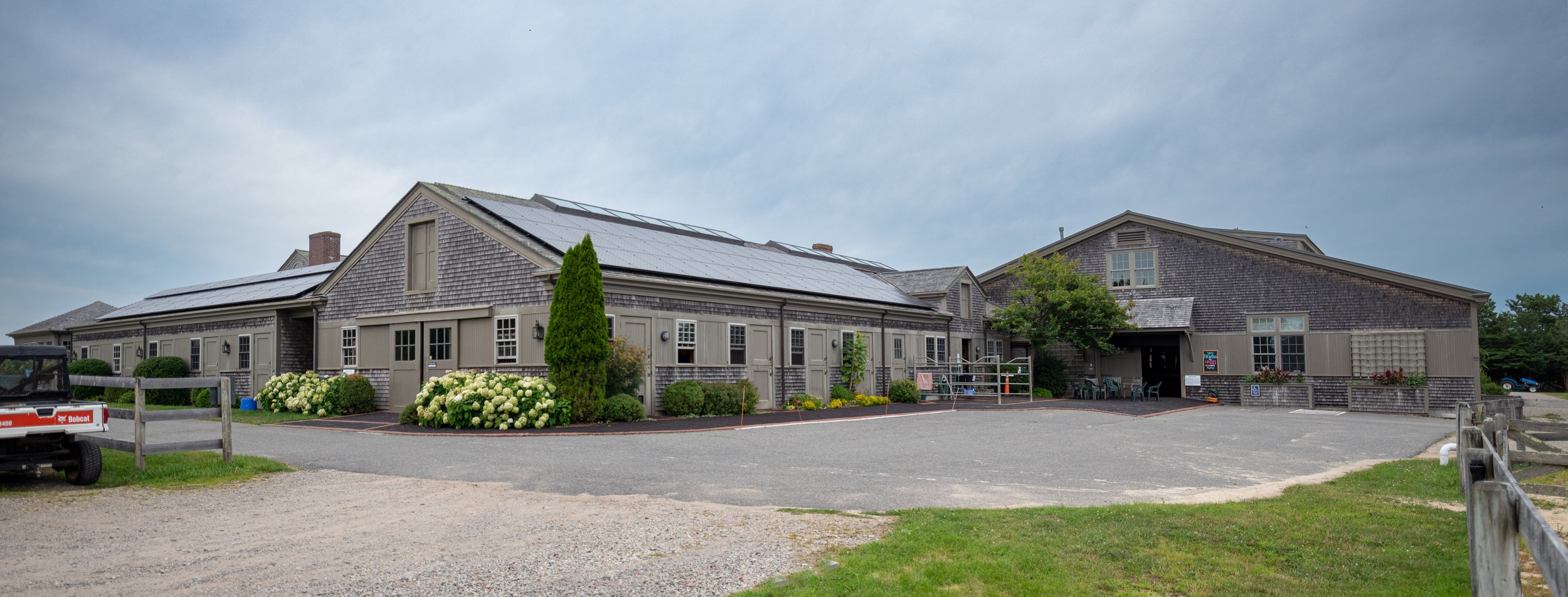
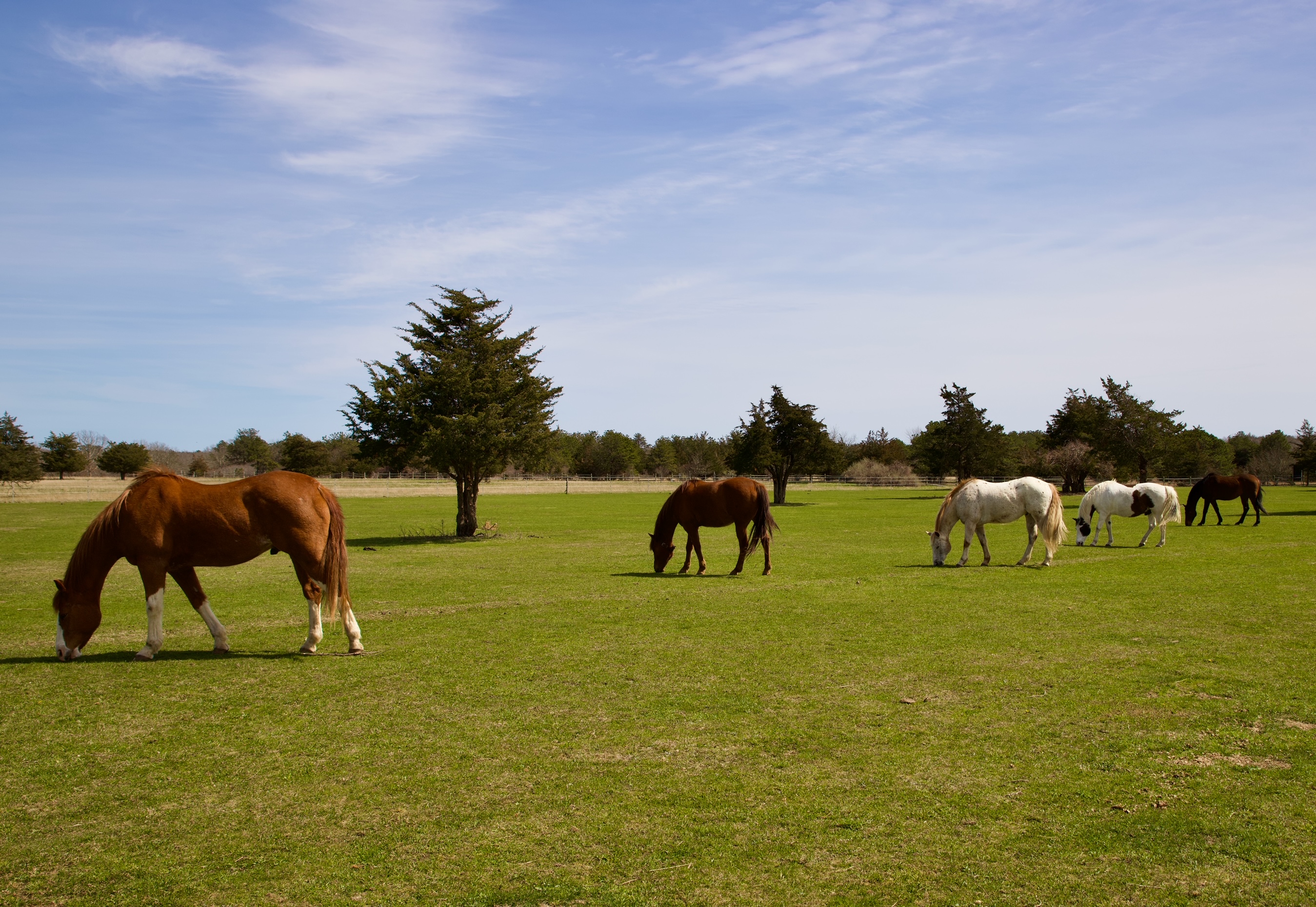
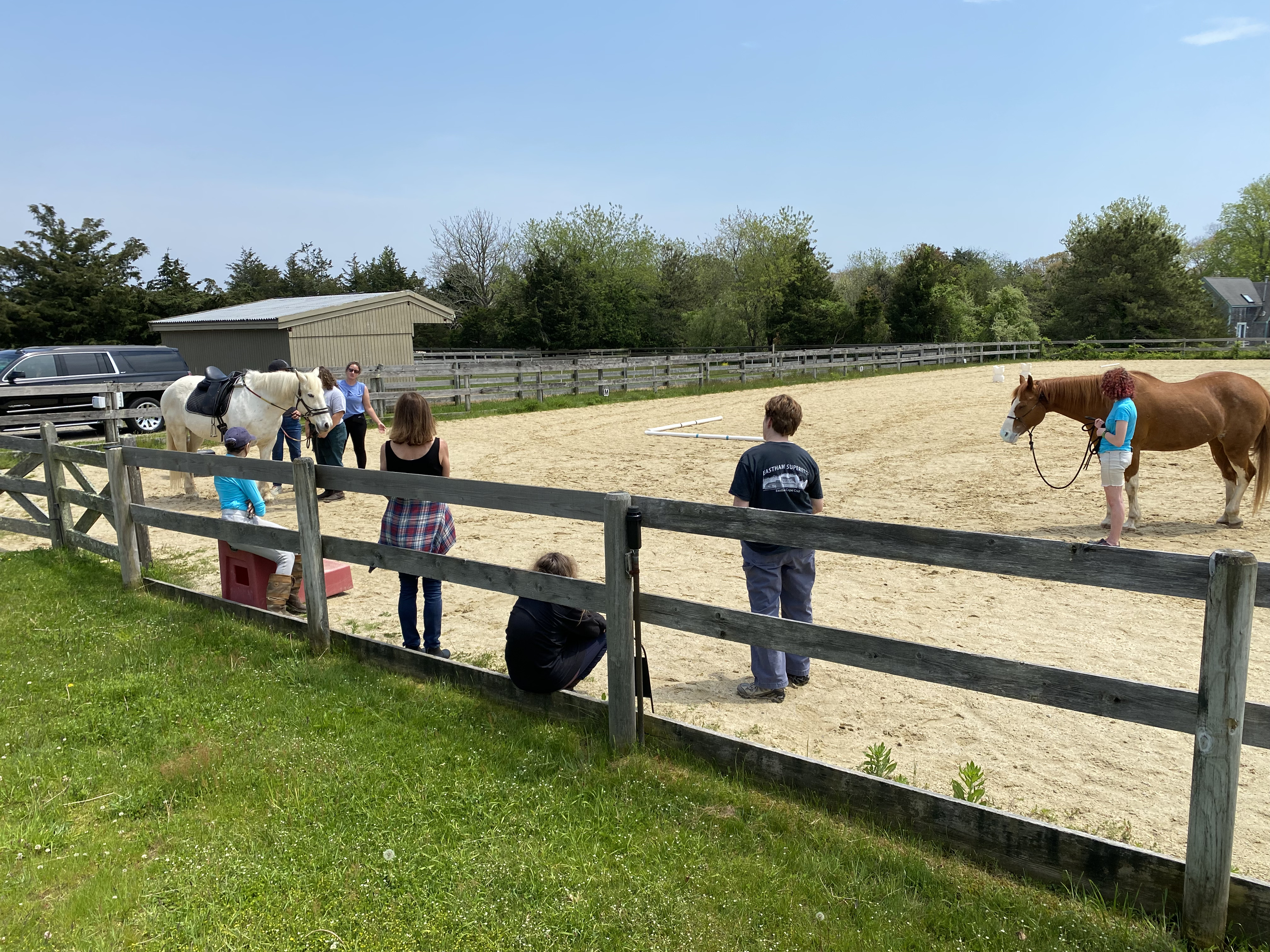
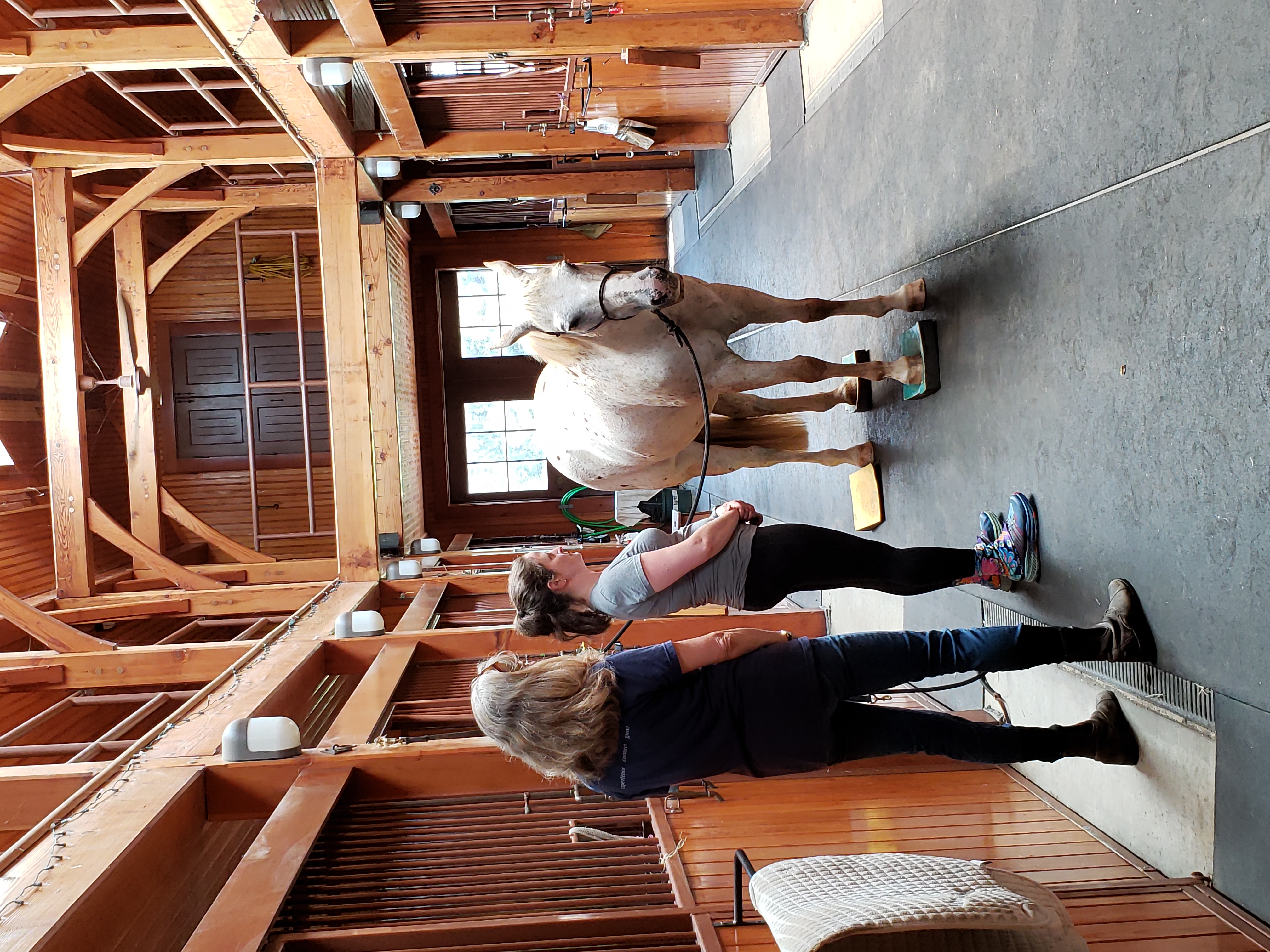
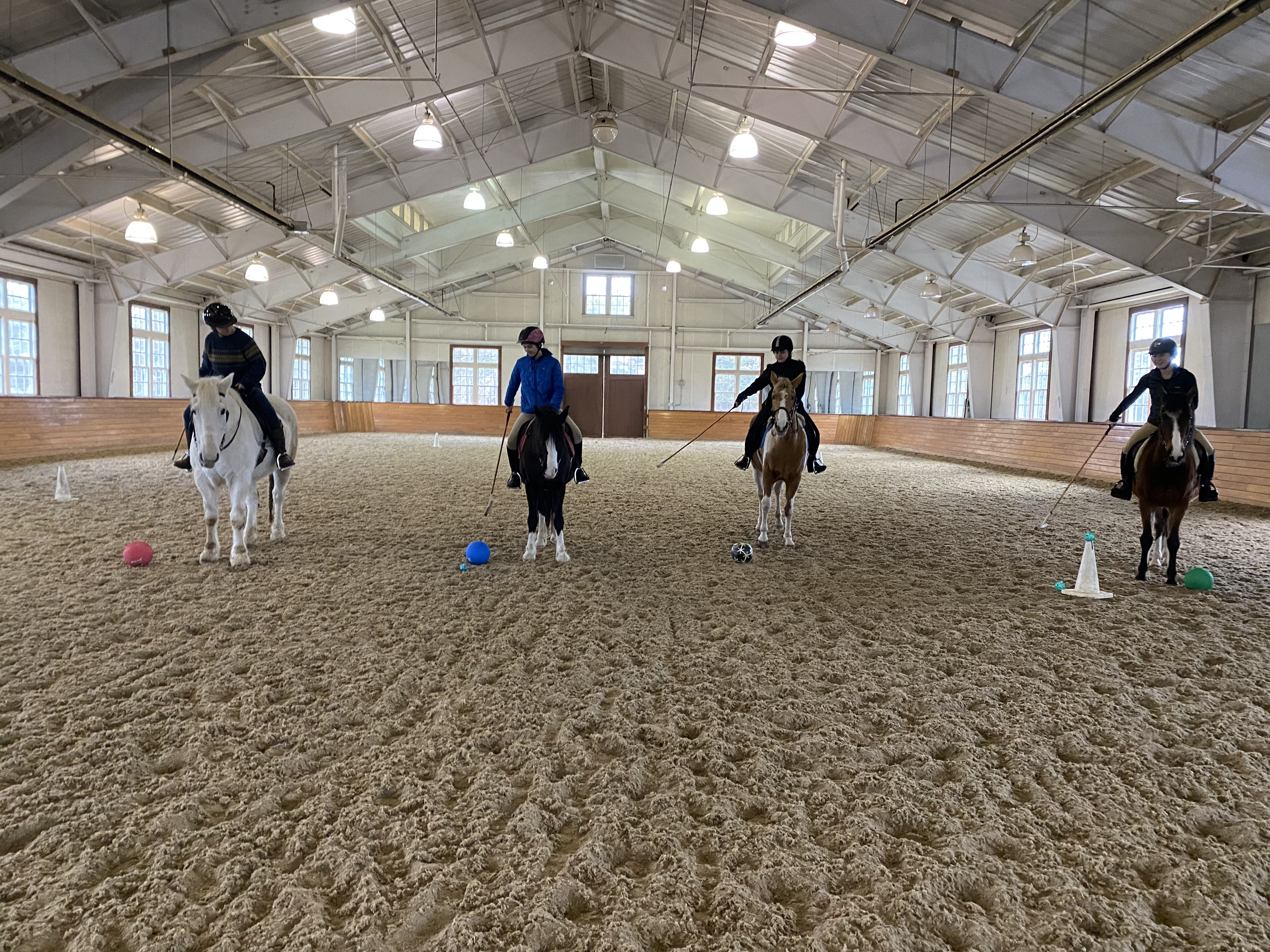
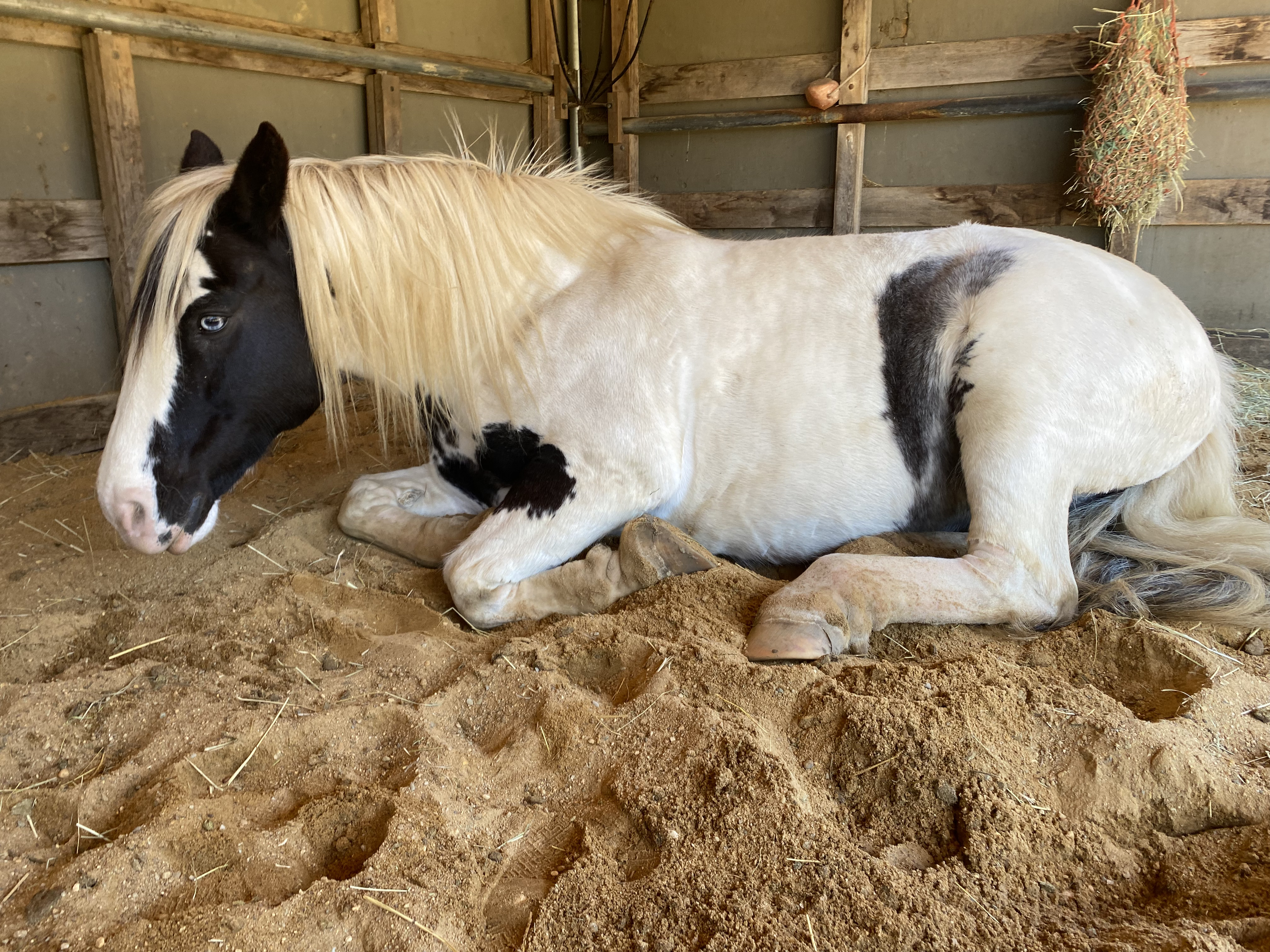
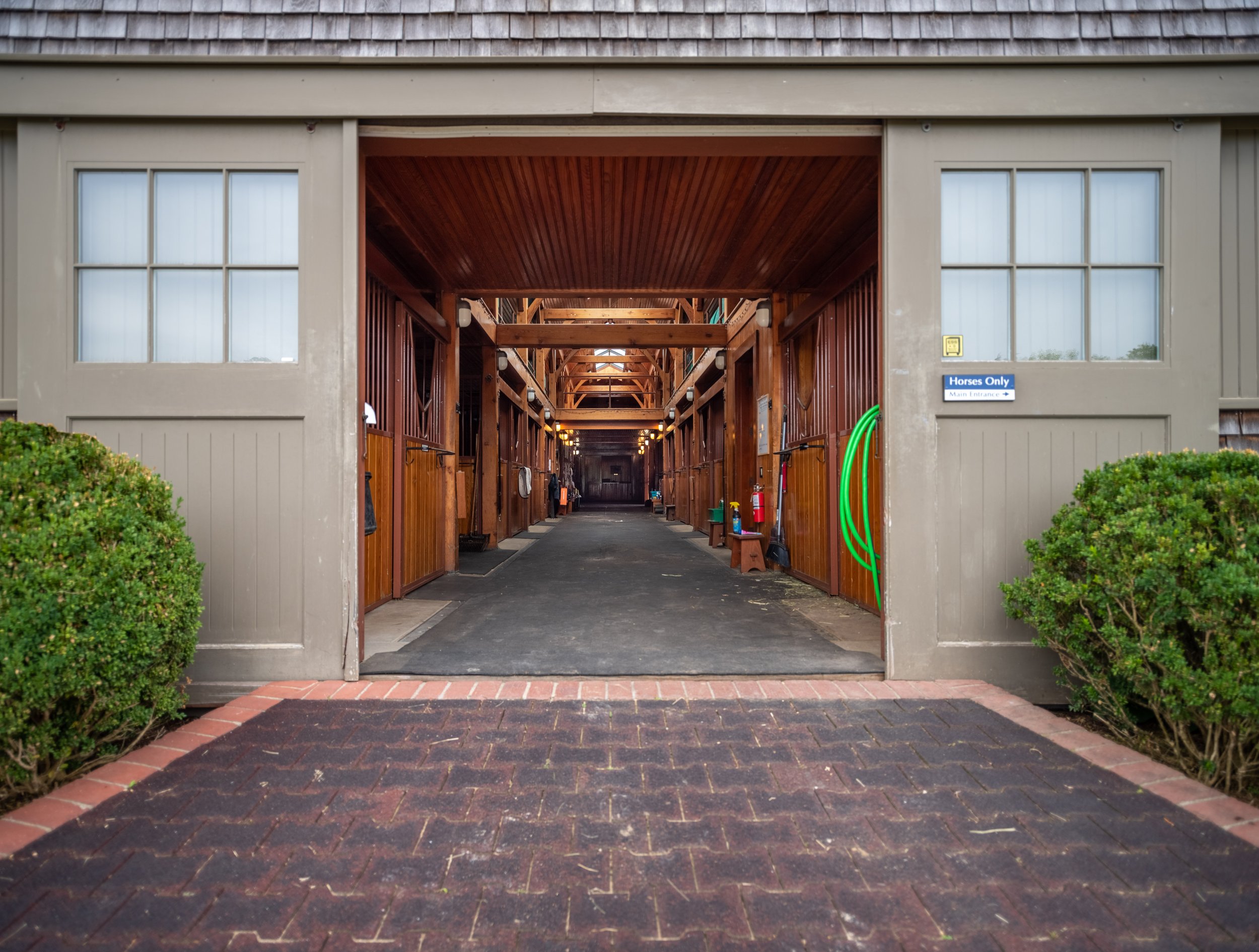
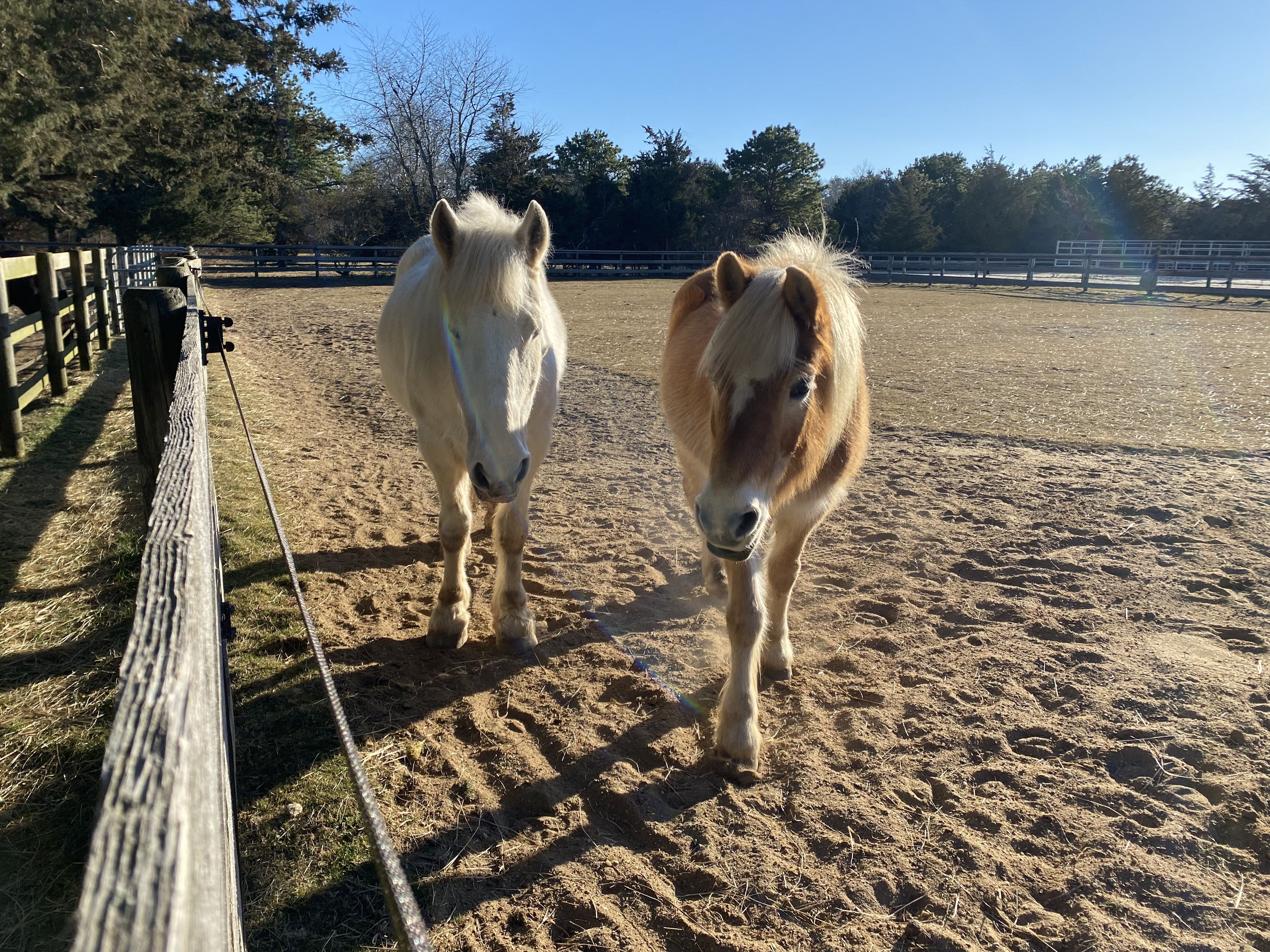
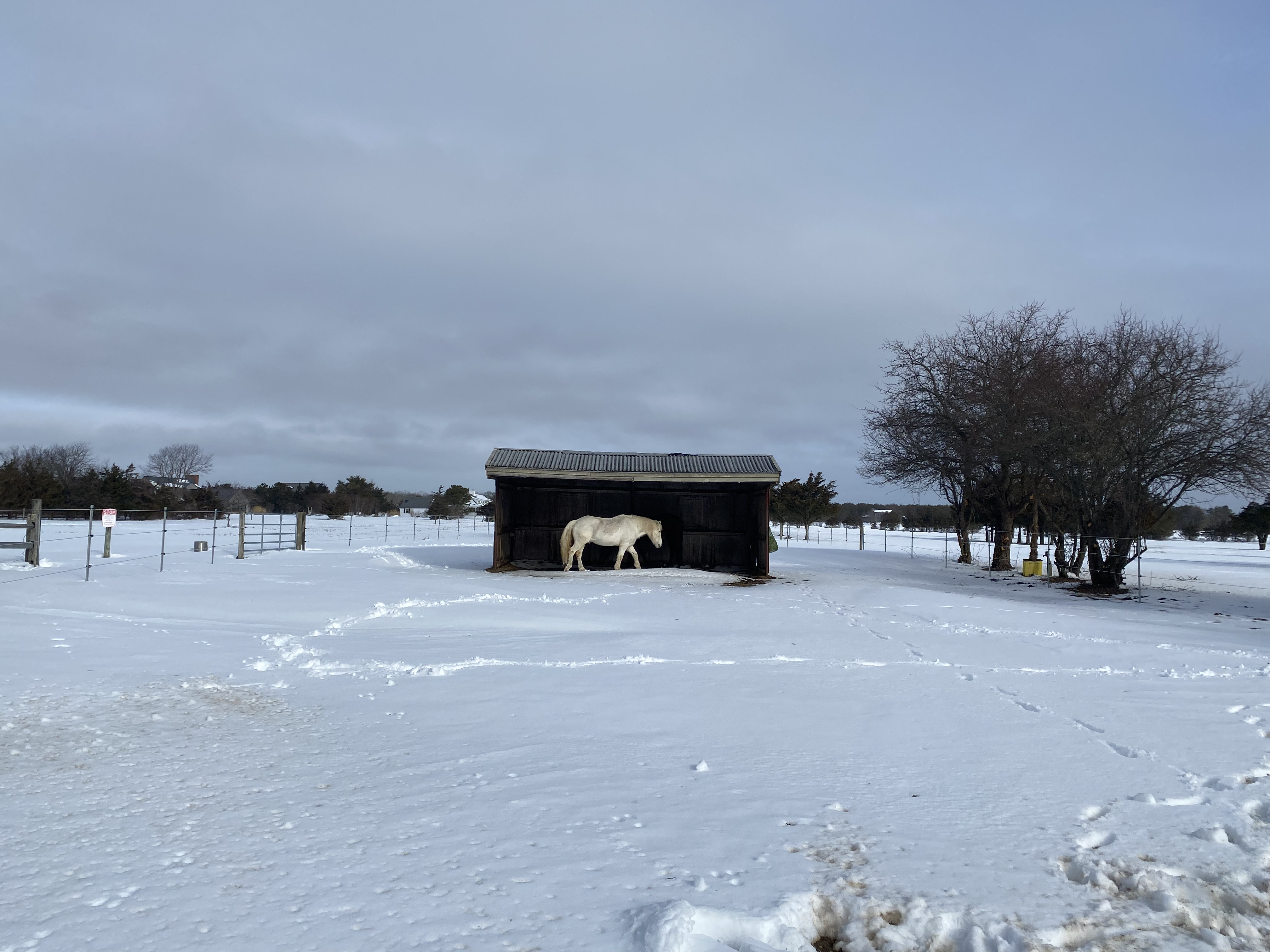
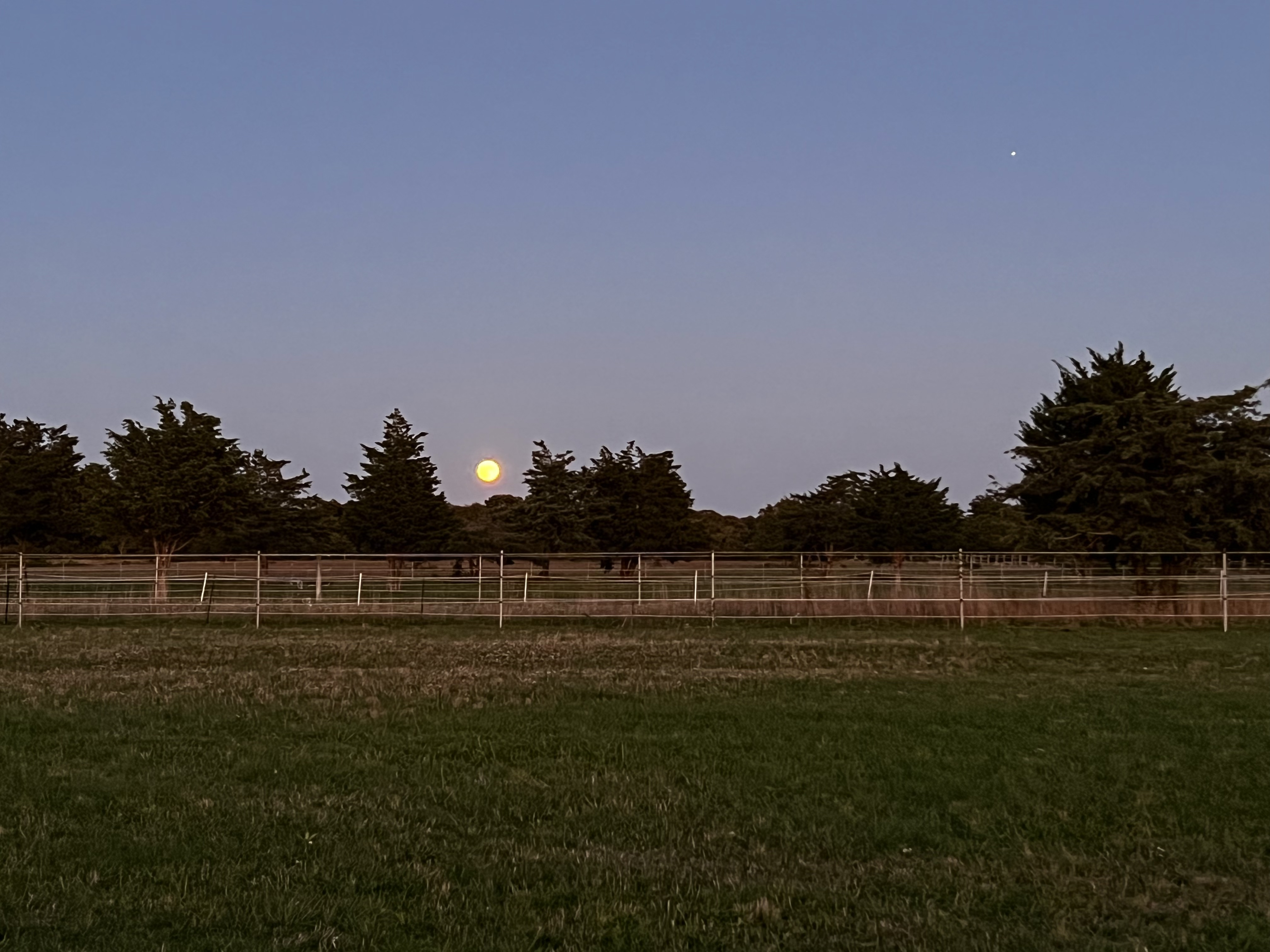
Are the organization's rules, restrictions and warnings (signage) conspicuously posted in easily accessible locations? Yes
Are the organization's emergency contacts, including veterinarian contact information, conspicuously posted in easily accessible locations? Yes
Are human and equine first aid kits easily accessible? Yes
Regarding all shelters where horses are housed including run-in sheds:
Do horses have assigned stalls in the barn/structure(s) or exclusively assigned shelter locations where they are separated from other horses with a barrier? No
How many hours per day, on average, are horses stalled or restricted to these sheltered exclusive shelter locations? 0-3;
How often are the stalls/shelters cleaned, i.e., kept in good repair and free of standing water, accumulated waste, sharp objects and debris? 6-7 Days a Week
Do all stalls/shelters allow horses to lie down, stand up and turn around and provide protection from inclement weather (wind, sleet, rain, snow and extreme temperatures)? Yes
Are stalls/shelters kept in good repair, with adequate ceiling height, and free of standing water, accumulated waste, sharp objects and debris? Yes
Are floors constructed and maintained for both good drainage and traction? Yes
Is there a ventilation and circulation system in place to allow free flow of air to control temperature, and humidity, and to prevent air stagnation? Yes
Is wiring inaccessible to horses and maintained for safety in all areas of facility? Yes
Are fire prevention/protection measures (fire alarms, extinguishers and sprinkler systems) maintained and in good working order? Yes
Is there adequate lighting to ensure safety in all areas of facility? Yes
How many hours per day, on average, are horses turned out:
Equines are out 24/7
Equines are out 24/7 except they are brought in if there is inclement weather
Equines are out 24/7 except when they are used for the conduct of the organization's programs
The following describes the pastures at this facility:
A dedicated staff person(s) is responsible for pasture management
All pastures are fenced to prevent escape or injury
Electric fencing is used; electric wires or tape fence are visibly marked
Fencing checks, such as broken or missing planks, loose fence posts, exposed or loose nails, detached wires, etc., are done regularly
Pastures are rotated
Pastures have natural protection for equines (i.e., trees)
Pastures have man-made protection for equines (i.e., shelters)
This facility does not have pastures where equines can graze on pasture grass
This facility has a written plan in place for pasture management, which includes guidelines for seeding, fertilizing, irrigation, mowing, dragging, harrowing, manure removal, removal of debris, the control of poisonous plants, and a schedule for cleaning
Barbed wire is used for fencing
The following describes the turnout areas other than pastures at this facility:
This facility has a written plan in place for the maintenance of turnout areas, which includes a schedule for cleaning, manure removal, and dragging
A dedicated staff person(s) is responsible for the maintenance of turnout areas
All turnout areas are fenced to prevent escape or injury
Electric fencing is used; electric wires or tape fence are visibly marked
Turnout areas have man-made protection for equines (i.e., shelters)
Fencing checks, such as broken or missing planks, loose fence posts, exposed or loose nails, detached wires, etc., are done regularly
This facility does not have turnout areas
Barbed wire is used for fencing
The following policies and procedures are in place at the facility to restrict public access and to keep horses safe:
There is a mechanism in place to monitor equines overnight
Hold Harmless signs are posted
Authorized Personnel Only signs are posted
Visitors are only permitted at specific times
Visitors are only permitted in specific areas
The property is fitted with motion lights
The property is fitted with a security system monitored by police or a professional service
The property owner, staff member or caretaker lives on the premises and ensures that public access is restricted and is responsible for the security of the facility and equines
A security guard is present at night
By Appointment Only signs are posted.
No Trespassing signs are posted
Entrance gates are locked at night
The property is fitted with a security system that is monitored internally by staff (or the property owner)
The perimeter of the property is fully fenced
Equine Care/Emergency Preparedness: Misty Meadows Equine Learning Center (*Main) 2026 and 2025 This section is required.
Horse Health Care/Barn Management Records: What system is used to collect and store health/horse care records?
Notebook or equivalent (technology not utilized)
Onsite computer with onsite backup storage system
Onsite computer with cloud-based backup storage system
Our organization utilizes a software application to maintain records
The following items are consistent with our feed management plan and practices:
Equines are provided with individualized feeding plans, including supplements, according to the equine's age, breed/type, condition, size, work level and any health issues, consisting of nutritious food provided in sufficient quantity and access to adequate natural forage, or be fed daily, or as recommended by the organization's veterinarian
Feed plans are determined in consultation with a veterinarian
Supplement plans are determined in consultation with a veterinarian
Equines are fed grain in groups
Staff and/or volunteers are trained in proper feed measurements and protocols and observed periodically to ensure they are feeding correctly
The feed chart is centrally located and updated as needed
The area(s) where hay, feed, grain, and supplements are stored are kept clean, free of debris and chemicals, and protected from weather and other animals in rodent-proof and mold-proof containers and grain bins
Feed, supplements and hay types are clearly labeled
Water sources, i.e., buckets, troughs, automatic waterers, etc. are kept clean, free of contaminants, debris and chemicals, protected from weather and other animals, and be positioned or affixed to minimize spillage.
Medications are kept in a secure area
Equines are fed grain in individual stalls
Is clean, potable water available at all times for all equines? Yes
Hoof Care: How often is hoof care provided for each equine? Every 4-8 weeks and when an issue arises
Dental Care: How often is dental care provided for each equine? Annually and when an issue arises
Horse checks: How often are equines visually and physically checked by personnel at the facility? Every day or 6 days a week
Our organization has the following parasite and fly/insect control protocols in place, including remedies used to control flies and insects:
Our organization follows the parasite control guidelines of our veterinarian, including fecal testing and de-worming
Fly/Insect Control Remedies:
Fly Spray Repellent
Fly Masks
Fly Sheets
The following represent the biosecurity practices in place at facility:
Our organization follows the biosecurity guidelines of our veterinarian
Sick, affected and/or quarantined equines do not have contact with other equines or other animals
The organization has a written biosecurity plan
Staff are trained in best practices related to biosecurity
Volunteers are trained in best practices related to biosecurity
Sick, affected and/or quarantined equines are cared for last if the caretaker must also care for healthy equines
Restricted access signs are posted at primary points of access to sick, affected and/or quarantined equines
Hand sanitizers are available at all primary points of access to sick, affected and/or quarantined equines
Footbaths are available at all primary points of access to sick, affected and/or quarantined equines
Manure and bedding from sick, affected and/or quarantined equines is removed from the facility - not put in open air piles, and not spread on pastures
Quarantine areas, such as stalls, aisle ways, paddocks, and common areas, are cleaned (and needed, disinfected) after conclusion of the quarantine.
Trailers/vans used by sick, affected and/or quarantined equines are cleaned and disinfected after each use and cleaning takes place away from where equines are sheltered
Equipment used by sick, affected and/or quarantined equines is not shared
Equipment used by sick, affected and/or quarantined equines is cleaned of organic debris and disinfected after each use
Latex gloves, or equivalent gloves, are worn when working with sick, affected and/or quarantined equines
A specific individual is trained and assigned to care for sick, affected and/or quarantined equines
Equines are not quarantined on arrival.
Additional information on biosecurity:
We are fortunate in that we do not have much turn over in our herd.
The following represent the manure removal practices in place at facility:
Manure is piled in an area where equines are not located
Manure is hauled, sold or given away
Our organization adheres to the manure management guidelines set by the state, local authorities, and/or our organization's veterinarian
Manure is stored in dumpster(s)
Manure piles are covered
Manure piles are composted or spread on pastures
The following steps are taken to help staff and volunteers readily identify each horse on the property:
Staff/volunteers are provided training on conformation, markings, colors, and breeds
Team leaders work with new staff/volunteers until they are able to identify the equines
Equines are assigned the same exclusive stall/shelter location each day
Name plates are located on the stall/shelter location
Photos are located on the stall/shelter location
Equines wear halters with nametags
A notebook or binder with photos and information on each equine is easily accessible
A map/diagram is posted showing the location of each equine with equine names and photos
Equine photos and profiles are available on the website
Staff and volunteers are provided with an information packet with equine profiles, including photos and detailed descriptions
Our organization has the following policies and procedures in place pertaining to tack, apparel and equipment:
All equines have specifically assigned apparel, equipment and tack (saddles/bridles if ridden) that is not shared
Saddle pads are shared
Blankets, sheets and turn out apparel are fitted and utilized for each equine appropriate to the equine's needs and the weather conditions
Blankets, sheets and turn out apparel are cleaned regularly as needed
Halters are shared
Riding Tack is always cleaned at least weekly
Riding Tack is inspected for overall working condition before each use by trained personnel
Riding Tack is assessed for fit before each use by trained personnel
Riding Tack is assessed for fit by trained personnel when an equine's body condition changes
Riding Tack is assessed for fit by trained personnel when an equine's disposition changes
This facility enlists the services of a professional saddle fitter at least once a year
Assigned riding tack is clearly labeled
Riding Tack is stored in a climate-controlled location
Helmets are shared
Helmets are cleaned/disinfected after each use
Helmets are replaced after a fall
Saddles are shared
Bridles are shared
Bits are shared
Blankets are shared
Sheets are shared
Turnout apparel is shared
Riding Tack is always cleaned after each use
Riding Tack is cleaned only when needed
Helmets are replaced at least every five years.
No equines are ridden; saddles, bridles, etc. not applicable.
Emergency Preparedness: Misty Meadows Equine Learning Center: *Main This section is required.
The following plans, policies, and procedures are in place at the facility to handle emergencies and address weather related issues, fire safety procedures, and/or any additional hazardous scenarios the facility could potentially experience:
The facility owns or has access to a generator
The facility maintains at least two weeks of hay, feed, shavings and medications
The facility collects and maintains medical information from staff, volunteers, and clients
The facility maintains appropriate liability and/or workers' compensation insurance
The organization has a written emergency preparedness/safety plan (EPP)
Emergency procedures are posted prominently
Medical emergencies for clients, staff, and volunteers
Medical emergencies for equines
Evacuation plans
Power outages
Fire
Natural Disasters - thunderstorm, hurricanes, earthquakes, tornados, etc
Protocols to notify emergency personnel
Building/facility exit plans
Local fire department and/or the state's emergency planning department procedures
Terrorist attacks
The facility follows the specific procedures to help PREVENT emergency situations:
Smoking is strictly prohibited
Permanent or temporary structures where equines are stalled are kept free of dust, cobwebs, trash, cleaning rags, and other flammable items
Aisles and doorways are kept clear
Heaters with automatic shutoff settings are used
NO SMOKING signs are posted prominently
Hay is stored away from permanent or temporary structures where equines are stalled
How often are the following checked or performed?
Fire Extinguishers are checked: Annually
Smoke detectors are checked: Annually
Fence lines are checked: Daily
Turnout Areas are checked: Daily
Sprinkler systems are checked: Not at all/NA
Fire drills are conducted: Semi-annually
Review of safety protocols with staff are conducted: Semi-annually
Review of safety protocols with volunteers are conducted: Semi-annually
The Emergency Preparedness Plan is reviewed and updated: Annually
Equine Transportation: 1= Onsite: 0 (0 + 0) + Offsite: 1
2-horse van/trailer with truck:
1 Access offsite;
© Copyright 2018 EQUUS Foundation 2329 3.00